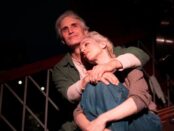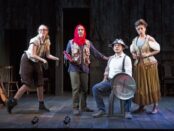Sumo
Despite its predictable overarching plot, "Sumo," produced jointly by the Ma-Yi Theater Company and La Jolla Playhouse, is never boring. Partly, that's because, as Mitsuo, Shih is villainously charismatic, portraying the preening bully with the disarming and false sense that there is a method to his sadism. But, even more compellingly, Sumo is an immersive and sumptuous eyeful--no matter your personal predilections for loincloths and bare, overhanging bellies--with a set, props, costumes, projections, and all that glorious sumo hair provided by Wilson Chin, Thomas Jenkeleit, Mariko Ohigashi, Hana S. Kim, and Alberto "Albee" Alvarado respectively. As for the main event, there is certainly loads of cheer-inducing sumo wrestling throughout the play, but it's the sumo karaoke after the intermission that adds much-needed joy to the proceedings. That exhilarating scene, aided by Paul Whitaker's vibrant lighting effects mixed with Fabian Obispo's equally energetic sound design, also offers director Ralph B. Peña the opportunity to let the actors cut loose, at least for a little while. [more]






